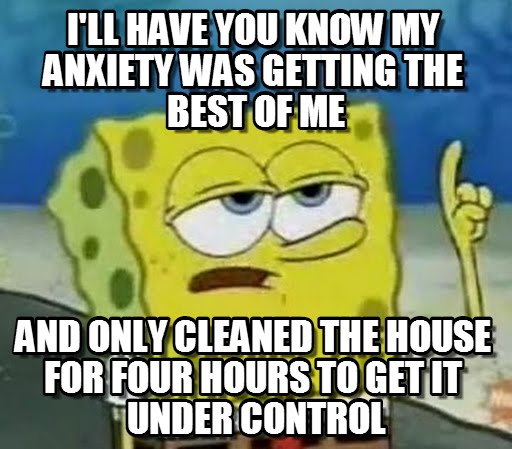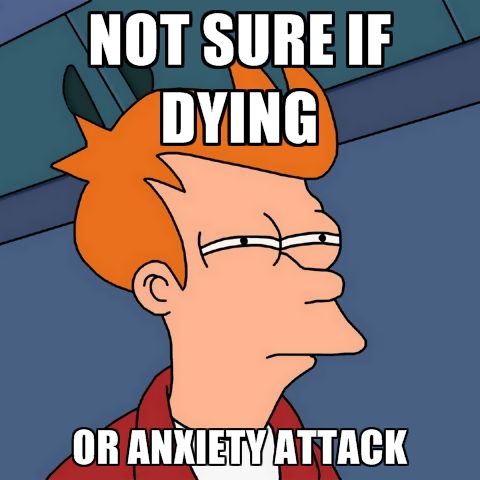1. A lot of psych meds can make you hopelessly sleepy–and it's worth it.
I don't want to give away too many details about things that aren't just about me, so suffice to say I used to be in a relationship with someone who had an anxiety disorder. This was both before and after mine reared its ugly head. His disorder was severe enough that he was heavily medicated. This medicine made him sleep more than anyone I've ever known, and it made me aggravated.
To be fair, my ex wasn't exactly domestic or helpful in many areas pertaining to our relationship, so part of my aggravation had to do with what wasn't being done when he was finally awake. However, I stop short of letting myself off the hook. Since then, I've been put on meds that make me ridiculously tired. I fight it and stay up until bed time, but I would nap all day sometimes if I could. The contrast between that and the lack of sleep when I am not medicated is stark. I'll take feeling nappy all day over that anytime, so now I know why he did. I feel bad for mornings when I woke him up, pissed that he would just roll over and ignore me . . . for hours. I feel bad for thinking he was just lazy. I'm not saying he wasn't, but I definitely know now that these pills can knock you out big time.
2. You can totally joke about mental illness.
Before OCD popped up in my life, I was either reverent or dismissive of mental illness–in equal measure. Sometimes, I would make more light of it than perhaps I should have. Other times, I was very somber about it. As society tried to become more politically correct about mental illness topics, I tried to follow suit, at least in public. I did have sincere empathy for people with mental illness and didn't want to be an *ss, so I wouldn't joke about it in polite society.
After being diagnosed with OCD, generalized anxiety disorder, depression, agoraphobia and even PTSD (I find that last one up for debate.), I am less inclined to take mental illness seriously in terms of humor. I have had a lot of laughs at the expense of myself and with other sufferers since I started talking openly about my experiences. In my opinion, some of them are hilarious. I've never known life to be this colorful, and I led a wacky life even before I got sick. Don't get me wrong. Mental illness is mostly dark side. Light barely gets through when we're in the thick of it. Nonetheless, the light that does get through has a lot of humor in it. I don't think people should ignore that. Seeing the humor in mental illness may help shed some of the stigma. Today, I don't care how polite the company is. I crack jokes about whatever I want.
3. Anxiety attacks run the gamut of physical symptoms.
Roughly eight years ago, I was working the line in a restaurant kitchen when a bunch of waitresses started huddling around the back door to the dock. This was unusual, as only one or two would go out to smoke at a time. I admit, cooks don't really like being distracted by big groups hanging around the kitchen, so I went to have a look. One of my favorite front of house gals was sitting in a chair hyperventilating. While another waitress offered her an inhaler, the wheels in my head clicked into place. I'd seen and heard of it dozens of times in my life at that point. This was the picture of a panic attack. She couldn't breathe. She was crying. She was scared. I waved off the girl with the inhaler in the dismissive way I had back when I was a young and cocky cook and informed the scared girl that she was having a panic attack. This is what I thought they all looked like until I had one myself.
When it came time for me to have anxiety attacks, it took me forever to know what was happening. They look nothing like what I thought a panic attack was supposed to look like. I've never hyperventilated. I hope to hell that stays true. I hate the idea of it. I think it looks like it sucks something awful. By now, I've probably had hundreds of panic attacks and recognize them for what they are. For me, and many others, panic attacks come with any of these symptoms: sweating, shaking, nausea, vomiting, heart palpitations, digestive upset, crying, heaviness in the limbs and numbness. I'm sure I missed some. I read once that panic attacks affect more of your body's systems at once than any other condition. I believe it.
4. Mental hospitals are not spas or asylums.
If you've been fed mainstream media your entire life like the rest of us, you've seen a few versions of what acute mental health treatment looks like. On the one hand, you have retreat-like, therapy-laden getaways that middle and upper class folk like to joke are vacation destinations for the over-stressed first-world adult. On the other hand, you have horrifying asylums that are so traumatic for patients that they are invariably haunted when they are inevitably abandoned after a scandal.
Neither picture painted by fiction is remotely true. I'm not sure I can even say it's somewhere in the middle. Most modern mental health hospitals are not at all what the uninitiated imagine. There's barely any viable therapy because most of them are not long-term. There's no forced cold water baths. Really, it's just a place where people who are more like security guards make sure you don't kill yourself or someone else. There's some vague, one-size-fits-all group therapy, meetings with overworked social workers and brief meetings with prescribers. There is a mix of people detoxing and the not addicted mentally ill with the former tipping the scales in many areas. Sure, there are some glimpses of fiction in the fact, such as mouth checks at med time, a bed with straps for unruly folk and a strict no touching rule that is repeated several times a day, but other than that, it's just a bland place filled with really interesting patients.
5. It's a layer cake of hurt.
Still, mental illness has it's upside. I don't say any of the above to make people feel bad for those with mental illness, though maybe they should. I say it because it's true. Sometimes, life is almost all black. Other times, it's only a little black with lots of neon colors mixed in. One of my favorite things about getting sick is that I think all the black has made me appreciate the neons more. I actually think I feel happy and calm in a bigger way now that I know what it's like to lose my ability to feel happy or calm.
*Disclaimer: I know Marie Antoinette never said "Let them eat cake." I still think it's funny.





No comments:
Post a Comment